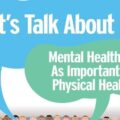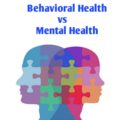Mental illnesses are health conditions involving changes in emotion, thinking or behavior (or a combination of these). Mental illnesses are associated with distress and/or problems functioning in social, work or family activities. Mental illness is treatable. The vast majority of individuals with mental illness continue to function in their daily lives.
Mental illness does not discriminate can affect anyone regardless of your age, gender, geography, income, social status, race/ethnicity, religion/spirituality, sexual orientation, background or other aspect of cultural identity. While mental illness can occur at any age, three-fourths of all mental illness begins by age 24.
Mental illnesses take many forms. Some are mild and only interfere in limited ways with daily life, such as certain phobias (abnormal fears). Other mental health conditions are so severe that a person may need care in a hospital.
How to Get Free Help For Mental Health Conditions
Mental health is the foundation for emotions, thinking, communication, learning, resilience and self-esteem. Mental health is also key to relationships, personal and emotional well-being and contributing to community or society.
Many people who have a mental illness do not want to talk about it. But mental illness is nothing to be ashamed of! It is a medical condition, just like heart disease or diabetes. And mental health conditions are treatable. We are continually expanding our understanding of how the human brain works, and treatments are available to help people successfully manage mental health conditions.
When should I seek help?
Seeking help is often the first step towards getting and staying well, but it can be hard to know how to start or where to turn to. It’s common to feel unsure, and to wonder whether you should try to handle things on your own. But it’s always ok to ask for help – even if you’re not sure you are experiencing a specific mental health problem.
You might want to seek help if you’re:
- worrying more than usual
- finding it hard to enjoy your life
- having thoughts and feelings that are difficult to cope with, which have an impact on your day-to-day life
- interested to find more support or treatment.
How To Get Free Mental Health Help
There are lots of options for support out there, although you might find some are more suitable for you, or more easily available. There’s no wrong order to try things in – different things work for different people at different times.
Emergency
If you’re in immediate distress, call the National Suicide Prevention Lifeline at 1-800-273 TALK (8255) or chat with them online. The Lifeline, which is free and confidential, can not only provide immediate support for those going through a rough time but they can also make referrals to mental health services near you.
Free therapist Volunteers
Trained therapists and counsellors can sometimes provide a range of different therapies free for which your doctor could refer you (known as secondary care). In some cases you might be able to contact them directly.
Friends, family, carers and neighbours
Sometimes it can help to talk to someone you trust about how you are feeling. They could:
- help you to find information
- discuss your options with you
- come with you to appointments
- help out with everyday tasks
- give encouragement and support.
NGO’s , Charity and third sector organizations
There are many national and local non-governmental organizations and charities which offer various support services, such as:
- helplines and listening services
- information and signposting
- other services such as peer support, talking therapies, advocacy, crisis care, employment and housing support.
Peer support
Peer support brings together people with similar experiences. Your peers can:
- support you and listen to how you’re feeling
- offer empathy and understanding
- share experiences, information, suggestions for self-care and support options.
Student services
Higher education institutions usually have a student wellbeing centre where enrolled students can go for support.
Community support services
If your mental health problems are severe or longer lasting, your doctor can put you in touch with specialist mental health services. These might include community mental health teams (CMHTs), social care services, residential care services, and crisis resolution and home treatment teams (CRHTs or ‘crisis teams’).
Workplace support
Some workplaces offer free access to support services such as talking therapies. This is called an Employee Assistance Programme.
Mental health hotlines
If a person is in distress, they may consider contacting a mental health hotline. These are free, and many are accessible 24/7. Some offer the option of texting instead of calling. A person might use one if they are considering self-harm, for example. A person can expect to receive emotional support from trained volunteers and professionals.
Online therapy and helpful apps
A range of therapy apps are available. They represent a branch of telemedicine and they allow a person to access mental health support, such as counseling, via webcam. Online sessions with a psychiatrist, known as teletherapy or telepsychiatry, are usually more cost-effective than receiving the treatment in person.
Meanwhile, for people grappling with issues such as anxiety and high levels of stress, free mindfulness apps may provide some support. A 2019 study, for example, found that one such app reduced stress levels in college students.
Finding free online therapists can be as easy as giving your employer’s benefit center a call or doing a quick search online. Here are a few places that might make finding free online therapy a breeze:
- Your health insurance provider. With the ongoing pandemic, most health insurances have started to foot the bill of some online therapy platforms. Check with them before settling with a pricey program.
- Employee Assistance Programs (EAPs). Most employers offer free counseling sessions with the platform of their choice. Don’t be afraid to shoot your benefits center or human resource official an email asking if they offer any services.
- Your local college or university. If you’re a student or a professor, your campus most likely has a counseling center or a social worker that can help you. If the university has a psychology department, they may host free clinics where students can put their skills to the test and help the general public.
- Mental health organizations. There are several national organizations, like Substance Abuse and Mental Health Services Administration (SAMHSA) and National Alliance on Mental Illness (NAMI), that can help you find free or low-cost online therapists or resources. These are usually trustworthy resources that they’ve worked with before and that they know can help you with your situation. SEE: How to Spot A Fake Psychologist






